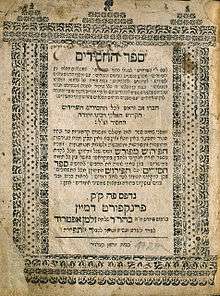Sefer Hasidim
 1724 edition | |
| Author | Judah ben Samuel of Regensburg |
|---|---|
| Language | Hebrew |
| Subject | Teachings of the Chassidei Ashkenaz |
| Genre | Non-fiction |
| Media type | |
The Sefer Hasidim or Sefer Chassidim (Hebrew: ספר חסדים, Book of the Pious) is a text by Judah ben Samuel of Regensburg, a foundation work of the teachings of the Chassidei Ashkenaz ("Pious Ones of Germany"). It offers an account of the day-to-day religious life of medieval German Jews, and their customs, beliefs, and traditions. It presents the combined teachings of the three leaders of German Hasidism during the 12th and 13th centuries: Samuel the Chassid, Judah the Chassid of Regensburg (his son), and Elazar Rokeach.[1]
This Hebrew book originated between the late 12th and early 13th centuries in the Rhineland, shortly after the Second Crusade. After this time, it circulated widely. It influenced the distinctive religious practices and Hebrew literary style of Jews in Ashkenaz and also shaped the discourse about Jewish ethics in medieval Europe and beyond.[2]
Several manuscripts are in existence, some more extensive than others. An edition based on the Parma manuscript, published by Chevra Mekitzei Nirdamim in 1891, was reprinted in 1955. Recently Otzar haPoskim Institute has published an elaborate version with numerous commentaries.
Commentaries on Sefer Hasidim
- Brit Olam by Chaim Joseph David Azulai, with additions Shomer ha-Brit
- Mishnat Chassidim by Saadia Helvona
- Mekor Chessed by Reuvein Margolies (1924, printed in the Mossad Harav Kook edition)
- Mishnat Avraham by Avraham Aharon Price (1955, Mikitzei Nirdamim edition)
References
- ↑ "Sefer Hasidim". Encyclopædia Britannica. Retrieved 6 February 2013.
- ↑ "Sefer Hasidim". Princeton University. Retrieved 6 February 2013.